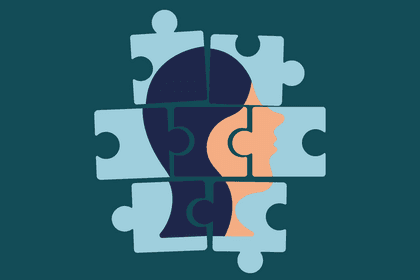
Data analysis is crucial for addressing major questions in health research. It can help identify patterns, make predictions and inform targeted interventions.
But in mental health, this potential is underutilised.
By leveraging existing mental health data, researchers could unlock new insights to better understand conditions and, in turn, develop more effective, targeted interventions.
That’s why Wellcome launched its Mental Health Data Prize in 2022.
The goal was to unite experts – from researchers to data scientists – to use available data sources and create innovative tools for studying anxiety and depression in young people.
The winning tools show how data can drive innovation and pave the way for future mental health breakthroughs.
What is Wellcome’s Mental Health Data Prize?
Wellcome’s first Mental Health Data Prize ran from 2022 to 2024.
Developed in partnership with Social Finance, it supported research teams in the UK and South Africa to understand what works for whom and why in youth anxiety and depression, and to create innovative digtial tools to enable research.
£1.4 million was awarded across eleven teams over three phases. Three winning projects were announced in December 2023, sharing a top prize of £500,000.
A sustainability phase continued until June 2024 to ensure longer-term plans for the tools were robust and have lasting impact.
Transforming mental health science with data-driven tools
Wellcome’s Mental Health Data Prize demonstrates the transformative power of data in advancing mental health.
The winning tools highlight the importance of cutting-edge analysis, lived experience and multidisciplinary collaboration.
Learn how they’re leveraging data to unlock new insights and discoveries.
Harmony
Led by Eoin McElroy and his team at Ulster University, Harmony is a free artificial intelligence (AI) tool to help researchers integrate and compare mental health questionnaire data across studies, countries and languages.
Thomas Wood, a data scientist on the project and Director of Fast Data Science, says that combining datasets with different instruments is essential to uncover new learnings.
“It gives your studies more power,” explains Thomas. “Researchers will then get better insights into what's causing anxiety and depression in young people.”
He hopes this will lead to new and improved interventions and policies in the future.
Building on the Data Prize work, the team have secured funding from UK Research and Innovation (UKRI) until 2025 and hope to further develop and expand the tool into new research areas.
DigiCAT
Having early evidence on interventions that may work is essential to focus mental health research.
DigiCAT, led by Aja Murray and her team at Edinburgh University, uses counterfactual analysis to identify the most promising intervention targets based on existing data.
An often-underused technique in mental health, the tool aims to make these advanced statistical methods more accessible to researchers.
"Mental health data is complicated, and you need tools that can handle that complexity,” says Aja.
She’s excited about the tools’ potential to speed up the discovery of new interventions.
“Anything that can make that process faster is going to be beneficial for the mental health of young people.”
Looking ahead, the team aims to expand the tool's use beyond researchers to policymakers, clinicians and other public service professionals, and translate it into different languages to meet international demand.
School Health Research Network (SHRN) dashboard
Led by Jeremy Segrott and his team at Cardiff University, the SHRN digital dashboard helps schools use data to promote good mental and physical health in young people.
Partnering with the Welsh Government and Public Health Wales, the tool allows schools to easily view and interpret their data from a national survey on student health in Welsh secondary schools.
"Access to data is crucial," says Jeremy. But for him, it's how you use the data that matters most.
“What we are particularly interested in is, once you have data, how can you actually use that to identify and deliver policies and practices that improve mental health and well-being in young people.”
The SHRN dashboard aims to make that process simpler for schools and policymakers. The team plan to extend the tool across secondary schools in Wales.
Fostering collaboration to drive innovation
The success of the prize stemmed from its multidisciplinary approach.
Diverse teams developed the tools, including clinical and research psychologists, data and computer scientists, and social scientists. Experts with lived experience and youth advisory groups ensured the research priorities and questions were relevant and impactful.
“It’s an exciting way to solve complex problems,” says Jeremy.
Lived experience advisors facilitated knowledge sharing and established peer-to-peer groups to build confidence in involving young people with experience of mental health challenges in research.
“It’s essential to build a team that reflects the people you are trying to support,” says Shuranjeet Singh, Lived Experience Consultant at Wellcome who advised on the prize development and delivery.
These collaborations show how diverse expertise can drive innovation and create effective solutions to complex challenges.
The future of data in mental health science
Ekin Bolukbasi, Data Prize Manager at Wellcome, believes the prize marks a new era in mental health research.
“I hope it will serve as an example for mental health researchers and data scientists across the world,” says Ekin.
As data analysis advances in mental health, new insights and discoveries are on the horizon.
"I think it will really be transformative," she adds.
Policymakers must then act on these findings and implement data-driven solutions to improve the lives of people living with mental health challenges.
To support this, Wellcome recognises the need for more data-led research globally. That’s why we’ve developed a second data prize in Africa.
In partnership with the African Population and Health Research Center, the prize will support teams in Africa to use local data and create digital tools to research anxiety and depression across the continent.
Applications for the prize have closed with awards to be announced in October 2024.
“The prize is tailored to the needs of the African continent,” says Ekin.
“I’m really excited to see the digital tools and data-driven insights that come out of this and how this may help people experiencing mental health problems in Africa,” she adds.






